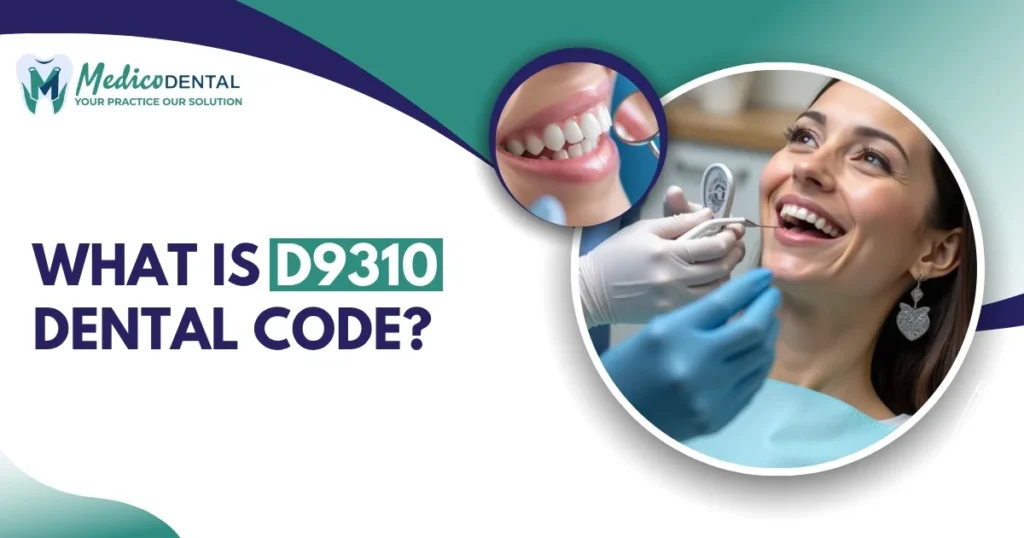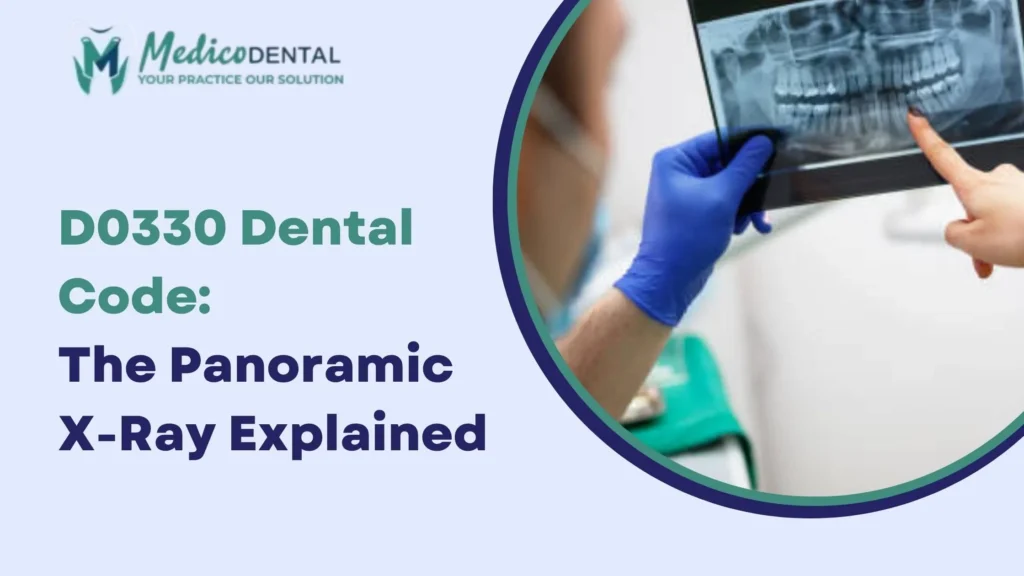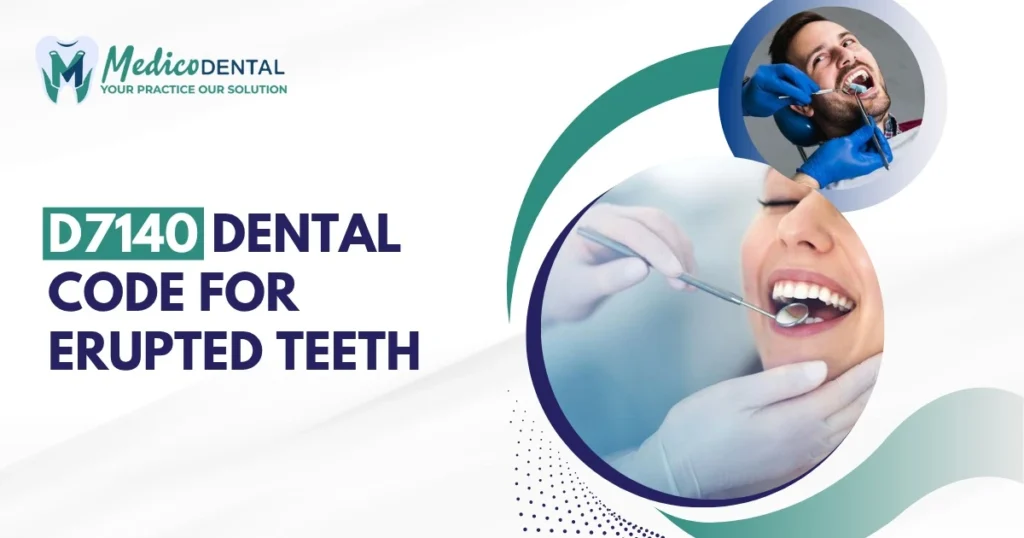The D9310 dental code, commonly known as the “Consultation Diagnostic Service,” plays a vital role in dental billing. It is used when a dentist consults with another healthcare professional such as a specialist or physician regarding a patient’s dental condition. This consultation ensures that the patient receives comprehensive care, including input from other medical professionals to inform dental treatments. Understanding when and how to use the D9310 code can help ensure accurate billing and prevent claim denials. Let’s dive deeper into its purpose, usage, and billing requirements.
Definition of D9310 Dental Code?
The D9310 code refers to a “Consultation Diagnostic Service Provided by a Dentist or Physician Other Than Requesting Dentist or Physician.” It’s used to indicate a situation where a dentist consults with another healthcare provider typically a specialist or physician who is not part of the same practice. This consultation helps the dentist gain a second opinion or more information about a patient’s condition, which could be relevant for diagnosis and treatment planning.
Importance of D9310 in Dental Billing
Accurate use of the D9310 code is essential in the billing process as it allows healthcare providers to be reimbursed for consultations that are outside the scope of routine dental care. Without proper coding, there is a risk of non payment or claim denials from insurance companies. Furthermore, it ensures that the dental office is reimbursed for services provided by external specialists, which ultimately supports patient care coordination across different healthcare fields.
Purpose of the D9310 Code
The purpose of the D9310 code is to provide clarity in dental billing when a dentist consults with another professional to assess a patient’s condition more comprehensively. The code helps document and validate the need for specialized input and ensures that the dentist’s treatment plan is informed by relevant medical knowledge from another provider.
When and Why is D9310 Used?
D9310 is typically used when:
A dentist seeks a second opinion from another healthcare provider (such as a physician or specialist) about a dental issue or treatment plan.
Medical conditions impact dental care, such as when a patient has a systemic illness that may influence dental treatment. A physician’s consultation may be necessary to understand how the medical condition affects the patient’s oral health.
Why Use D9310?
Using D9310 allows for formal documentation of the consultation, which supports the treatment plan. It ensures that the dentist has gathered relevant expertise from other healthcare professionals, promoting well rounded care and proper billing for these services.
Role of the D9310 Code in Healthcare Consultations
The D9310 code facilitates cross disciplinary collaboration, which is essential for comprehensive patient care. It ensures that the dentist’s decision making process is informed by expert opinions from medical professionals or specialists. Whether it’s a complex case or a simple consultation, D9310 enables the integration of medical insights into dental care, ultimately improving patient outcomes.
Billing Requirements for D9310
To correctly bill using the D9310 code, certain conditions must be met:
Consulting Healthcare Professional: The provider consulted must be a licensed and qualified healthcare professional.
Request by Another Provider: The consultation must be requested by the patient’s primary dentist or another healthcare provider not by the patient themselves.
Documentation: Proper documentation is required in the patient’s medical record, including details of the consultation, reasons for the consultation, and any conclusions or recommendations.
Separate Practice: The consulting professional must be from a different dental practice or healthcare setting. This code is not applicable for consultations within the same practice.
Who Can Use the D9310 Code?
The D9310 code can be used by:
Dentists: When they need to consult with another healthcare provider outside their practice for a second opinion or advice on complex cases.
Physicians: In cases where a physician refers the patient to a dentist, and a consultation between the two providers is required.
Documentation and Validation of the Consultation
Accurate documentation is critical when billing for a consultation using the D9310 code. Healthcare providers must include:
Details of the Consultation: The reasons for the consultation and any issues discussed.
Consulting Provider’s Information: The qualifications and details of the professional being consulted.
Patient Record: Evidence that the consultation was necessary and contributed to the care or treatment plan.
Communication: The dentist must communicate the consultation results and how the insights provided will impact the treatment plan.
When Should the D9310 Code Be Used?
The D9310 code should be used when:
- The consultation involves external healthcare providers (i.e., not within the same dental practice).
- A second opinion is required to assess the patient’s condition or treatment needs.
- The consultation is medically necessary, such as for a complex case involving both dental and medical concerns.
It should not be used for routine checkups or if the consultation occurs entirely within the same dental practice or among providers in the same practice.
Example Scenarios for Using D9310
Case 1: Dentist Consulting with a Specialist
A general dentist may consult with an orthodontist to get an opinion on the treatment needs for a patient with severe malocclusion. The orthodontist’s input is crucial for planning a personalized treatment plan, and this consultation is documented using the D9310 code.
Case 2: Dentist Consulting with a Physician
A dentist may consult with a physician regarding a patient’s diabetes management. Understanding how the patient’s blood sugar levels affect oral health is essential for the dentist to adjust their treatment plan. This consultation would be documented using the D9310 code.
Non Applicable Cases: What D9310 Doesn’t Cover
While the D9310 code is versatile, there are cases where it should not be used:
Intra practice consultations: If the consultation is conducted between providers in the same dental practice, the D9310 code is not applicable.
Routine checkups or non urgent matters: The D9310 code is not meant for general consultations or routine visits where no medical consultation with a different provider is involved.
D9310 Code in Practice: Dos and Don’ts
The D9310 code is essential for dental professionals when billing for consultations with outside healthcare providers. Using this code correctly ensures accurate reimbursement, while improper usage can result in claim denials or delays. Let’s dive into the best practices and common mistakes to avoid when using the D9310 code.
Best Practices for Billing D9310 Correctly
To make sure you’re using the D9310 code correctly, follow these key practices:
Ensure a Valid Request: The consultation must be initiated by the patient’s primary dentist or another healthcare provider, not the patient themselves. This step is crucial for proper billing.
Consultation with an External Provider: The healthcare professional being consulted should not be part of the same practice. D9310 is specifically used for consultations between separate entities either a dentist and a specialist or a dentist and a physician.
Proper Documentation: Always document the reason for the consultation, details of the findings, and how it impacts the treatment plan. Include the qualifications of the consulted provider and the consultation’s outcomes.
Accurate Coding: Use D9310 for any consultations related to diagnostic services, but avoid using it for routine or intra practice consultations. It’s a good practice to double check with the provider to ensure the consultation’s appropriateness for this code.
Follow Insurance Requirements: Some insurance providers may have specific requirements for what constitutes an eligible consultation. Check with the insurance company beforehand to avoid any issues when submitting claims.
Common Mistakes to Avoid When Using D9310
While D9310 is relatively straightforward, there are a few common errors that dental professionals should be aware of:
Misusing the Code for Routine Consultations: The D9310 code should not be used for regular checkups or intra office consultations. It’s strictly for consultations with external providers.
Failing to Document the Consultation: Not documenting the details of the consultation, including the reasons for it and any results, can lead to claim denials. Always ensure you have the right documentation in the patient’s medical record.
Consulting Within the Same Practice: If the consultation is with a provider in the same practice, D9310 does not apply. The code is intended for consultations with external healthcare professionals.
Not Validating the Provider’s Credentials: Make sure the consulting provider is a licensed healthcare professional. Failure to do so can lead to issues with billing and insurance claims.
Incorrect Timing of the Consultation: The consultation should be timely and relevant to the patient’s treatment plan. Avoid using D9310 if the consultation is too delayed to affect the treatment or diagnosis.
State and Insurance Carrier Variations
How Insurance and State Guidelines Affect D9310 Billing
While the D9310 code serves a standard purpose, its billing requirements can vary significantly depending on the state and insurance carrier. Each insurance provider or state may have different interpretations of what qualifies as a “consultation” and how it should be reimbursed. For example:
Some states may require additional forms or paperwork to accompany D9310 claims, while others may need specific codes or modifiers to clarify the nature of the consultation.
Insurance carriers may have their own definitions of a “specialist” or “physician” and could limit the types of consultations that are reimbursed under the D9310 code.
Understanding the Differences Across Providers
When billing for consultations using D9310, it’s essential to be aware of the specific requirements of each insurance provider. Not all providers will reimburse the same services or interpretations of consultations. This is why it’s essential to:
Review the payer’s guidelines before submitting a claim to ensure that your consultation qualifies under their requirements.
Consider reaching out to your insurance carrier’s support team for clarification on whether a consultation is eligible for reimbursement under the D9310 code.
Conclusion
The D9310 dental code is an essential tool for ensuring accurate billing when a dentist seeks professional consultation from another healthcare provider. By adhering to best practices and understanding the variations in state and insurance carrier guidelines, dental professionals can ensure that they are reimbursed correctly for these consultations. The proper use of D9310 not only prevents claim denials but also supports effective, collaborative patient care across healthcare disciplines.
To maximize the effectiveness of using the D9310 code, make sure that all documentation is thorough, all consultations are properly validated, and that you stay updated on the billing guidelines specific to each insurance provider and state. This will lead to smoother billing processes, greater financial accuracy, and enhanced patient care.
FAQs
Can the D9310 code be used for consultations within the same practice?
Ans. No, D9310 is only applicable when the consultation is with an external provider. If the consultation occurs within the same practice, you cannot use this code.
How do I document a consultation for D9310?
Ans. You should include the reason for the consultation, the name and credentials of the consulted provider, and the results or recommendations. This documentation should be added to the patient’s medical record for future reference.
Does D9310 cover second opinions from specialists?
Ans. Yes, D9310 can be used for second opinions from specialists, as long as the consultation is medically necessary and is documented correctly in the patient’s record.
Are there any exceptions to the D9310 billing requirements?
Ans. The primary exception would be when the consultation does not meet the requirements set by the insurance provider or state regulations. Always check the specific guidelines of the insurance carrier before billing.
Can I bill for a D9310 consultation if the patient requests the consultation directly?
Ans. No, the consultation must be requested by the patient’s primary dentist or another healthcare provider. If the patient requests the consultation directly, D9310 is not applicable.



